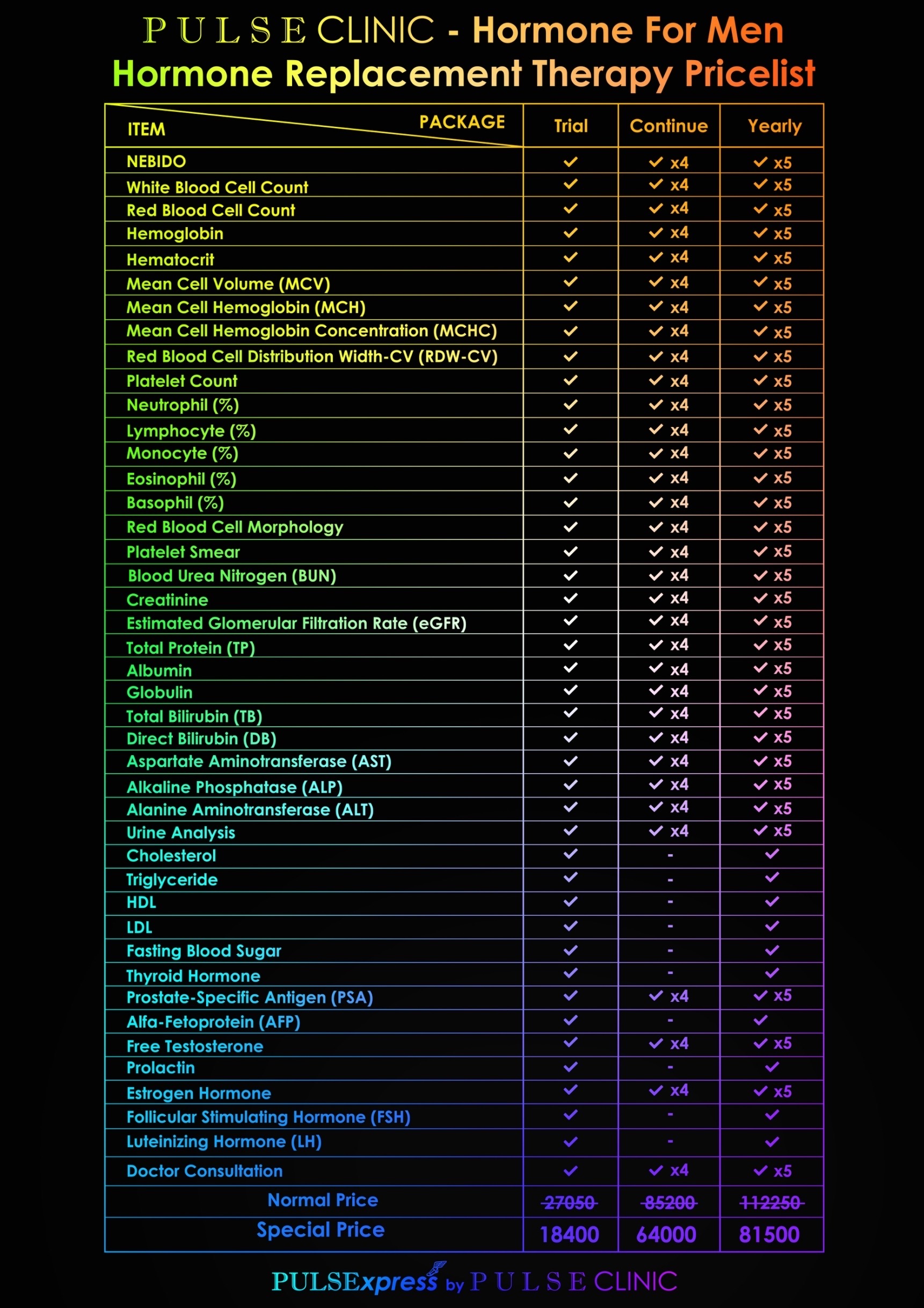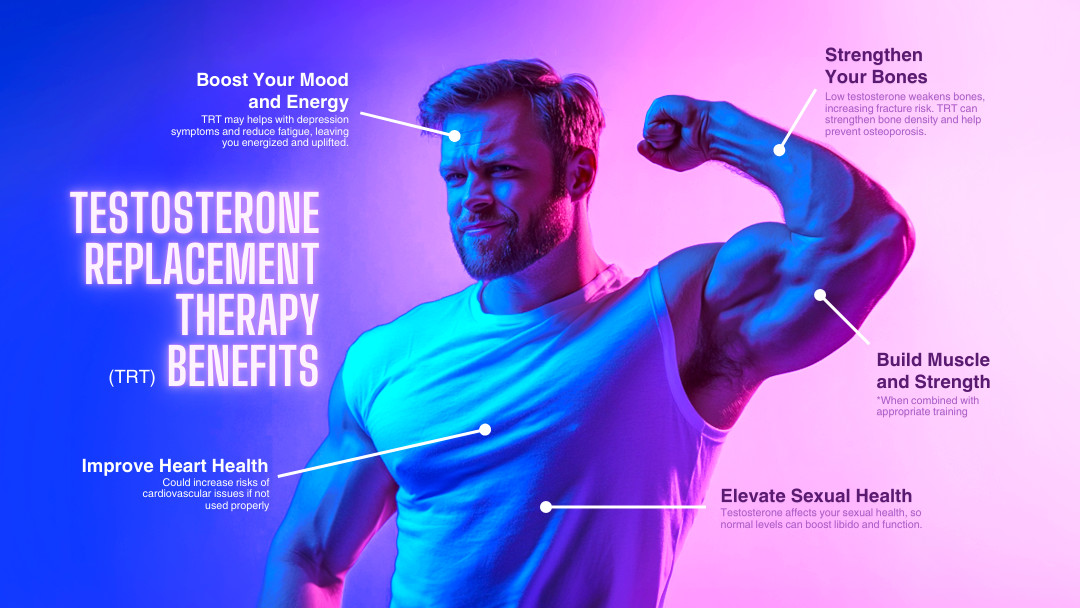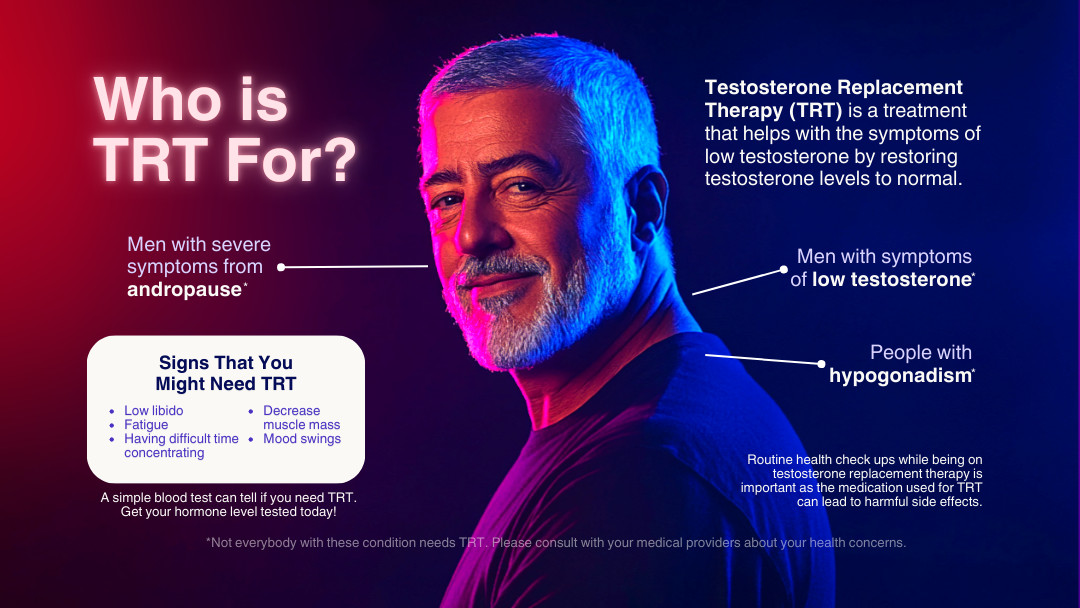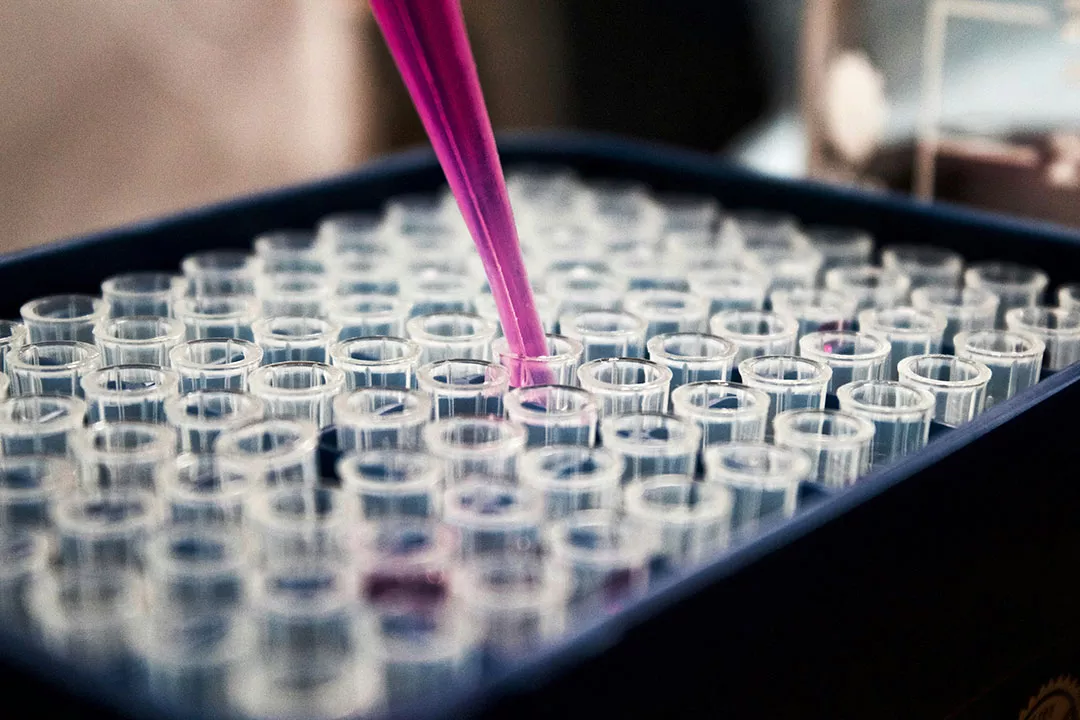Testosterone Replacement Therapy (TRT)
25622
Testosterone Replacement Therapy: involves administering testosterone through injections, patches, gels, or pellets. TRT aims to restore testosterone

What is Testosterone Replacement Therapy (TRT)
As men age, testosterone levels naturally decline, dropping about 1% per year after the age of 30. However, teststerone replacement therapy (TRT) is not only for older men. Studies show that modern men are losing testosterone faster than previous generations. Maintaining healthy testosterone levels can help reduce these risks and improve overall well-being.
This can lead to symptoms like reduced energy, weight gain, lower sex drive, and increased risks of erectile dysfunction (ED) and type 2 diabetes. For those considering testosterone therapy in Thailand, always consult with a healthcare professional to determine the best treatment plan for your needs.
Contact us at info.bkk@pulse-clinic.com or chat on your preferred platform:
![]() +66 65 237 1936
+66 65 237 1936  @PULSEClinic
@PULSEClinic ![]() PulseClinic
PulseClinic
Buy AndroGel and Other Testosterone Medication in Thailand
Order AndroGel Online from PULSE Clinic Today: Convenient Home Delivery with Discreet Worldwide Shipping!
Nebido, Testosterone Enanthate, and Testosterone Cypionate are commonly used medications for testosterone replacement therapy and testosterone augmentation. These treatments help men manage low testosterone levels effectively.
At PULSE Clinic's online pharmacy, you can now easily access these testosterone medications. Get your prescription refilled today and enjoy the convenience of our reliable service. If you're looking to get a testosterone medication refill online, email us at pulseliving@pulse-clinic.com or have a chat with us on your preferred platform
![]() +66-84-226-2569
+66-84-226-2569  @PulseRx
@PulseRx ![]() PulseClinic
PulseClinic
What is Testosterone?
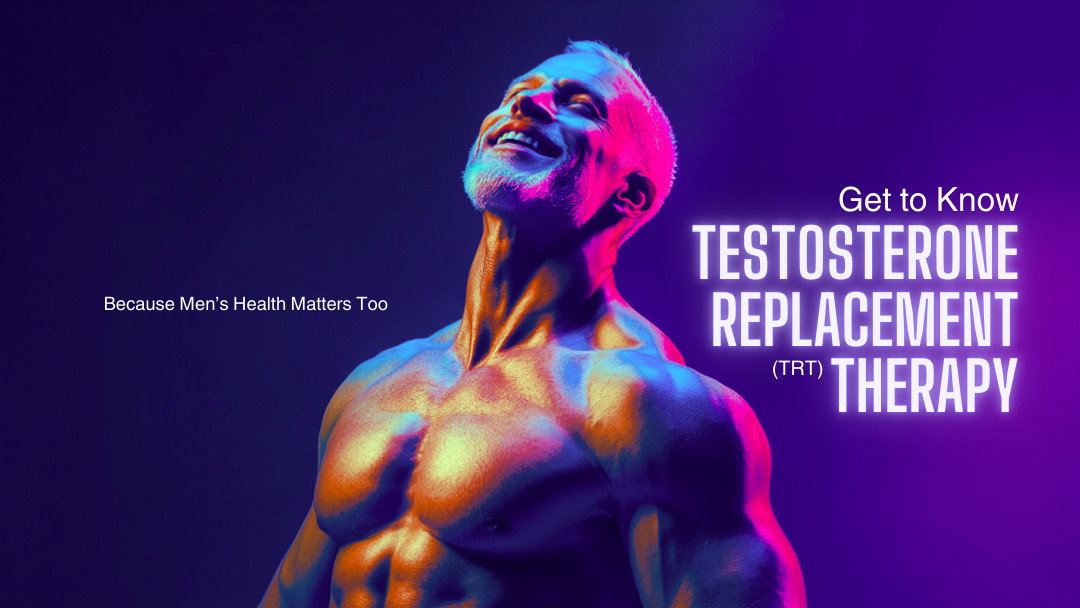
An Overview of Testosterone Replacement Therapy
Testosterone replacement therapy, or TRT, is a way to treat men with hypogonadism, which has low testosterone levels. A crucial factor in male development and reproductive health is the hormone testosterone, which the testicles produce. For example, it causes male traits like facial and pubic hair, a deep voice, and a lot of muscle mass to develop. However, low testosterone levels can lead to several problems, such as low sex drive, trouble getting an erection, feeling tired, and having less muscle mass.
TRT involves administering testosterone through injections, patches, gels, or pellets. TRT aims to restore testosterone levels to a normal range and alleviate symptoms. However, TRT is not recommended for all men with low testosterone. It is usually only recommended for men with severe symptoms and low testosterone levels caused by a specific medical condition.
TRT can cause acne, breast tenderness, sleep apnea, and blood clots, among other side effects. It may also increase the risk of prostate cancer and heart attacks. Therefore, before starting treatment, talking to a healthcare provider about TRT's possible risks and benefits is essential.
What Caused Low Testosterone (Male Hypogonadism)?
Male hypogonadism can impact individuals with testicles at any stage of life, from birth to adulthood. It's challenging to determine exactly how widespread low testosterone is, as various studies use different criteria to define it. Research indicates that approximately 2% of men may have low testosterone, with some studies estimating that over 8% of men between the ages of 50 and 79 are affected.
People are more likely to experience low testosterone if they:
- Are older - Testosterone levels naturally begin to decrease with age, usually starting around the age of 30. This reduction is a normal aspect of aging, with an estimated gradual decline of about 1 to 2% per year.
- Are overweight or Have poorly controlled Type 2 diabetes- Men who are overweight often have low testosterone levels, even without any identifiable disorder that might contribute to the condition. In cases of moderate obesity, the decrease in total testosterone is primarily due to reduced levels of sex hormone binding globulin, which is associated with insulin resistance. Losing weight can help restore testosterone production in many individuals. You can also consider medication for type 2 diabetes like Ozempic or weight loss aids like Saxenda to support a smoother testosterone therapy journey.
- Suffer from obstructive sleep apnea - Sleep apnea can negatively affect both sleep quality and duration, which in turn lowers testosterone levels. This reduction is linked to factors such as interrupted sleep, periods of low oxygen (intermittent hypoxia), and less time spent in deep and REM sleep.
- Have long-term health conditions like kidney disease or liver cirrhosis
- Live with HIV/AIDS - HIV can directly affect testicular function and contribute to overall health issues. Antiretroviral therapy (ART) can help restore testosterone production once the viral load in your blood is reduced to undetectable levels.
What is the Leading Symptom of Testosterone Deficiency Syndrome?
Hypogonadism, another name for testosterone deficiency syndrome, is a condition that happens when the body doesn't make enough testosterone. Testosterone is essential for developing male reproductive tissues and secondary sexual characteristics. Testosterone deficiency syndrome symptoms can differ depending on how bad the condition is and how old the person is when it starts to show up.
Some common symptoms of the testosterone deficiency syndrome in men may include:
- Reduced sex drive: Testosterone is essential for maintaining libido, or sex drive.
- Men with low testosterone levels may experience a decrease in their desire for sexual activity.
- Erectile dysfunction: Testosterone plays a role in the development of erections.
- Men with low testosterone may have difficulty achieving or maintaining an erection.
- Decreased muscle mass: Testosterone helps to build and maintain muscle mass.
- Men with low testosterone may experience a decline in muscle mass.
- Increased body fat: Testosterone plays a role in regulating metabolism and body fat distribution.
- Men with low testosterone may gain weight, particularly around the abdomen.
- Decreased bone density: Testosterone helps to maintain bone density.
- Men with low testosterone may be at increased risk for osteoporosis, a condition characterized by weak and brittle bones.
- Mood changes: Testosterone can affect mood.
- Men with low testosterone may experience changes in mood, such as feeling more tired or depressed.
- Changes in cognitive function: Testosterone may affect cognitive functions such as memory and concentration. Men with low testosterone may experience changes in these areas.
It's important to note that other factors can also cause these symptoms, and it is essential to see a healthcare professional for a proper diagnosis and treatment.
Testosterone replacement therapy (TRT) is an option for men with testosterone deficiency syndrome (hypogonadism). TRT involves replacing the body's missing testosterone to help alleviate the symptoms of hypogonadism.
How Do I Know If I Have Testosterone Deficiency Syndrome?
A doctor will usually take a detailed medical history and physical exam to determine if someone has testosterone deficiency syndrome. They may also order blood tests to measure testosterone levels. It is significant to note that factors like age, body weight, and specific medications can affect testosterone levels, which can vary throughout the day. Because of this, the blood test may need to be done more than once to confirm a diagnosis of TDS.
In some cases, additional tests may be ordered to rule out other conditions that can cause similar symptoms, such as pituitary gland disorders, chronic illnesses, and certain medications.
It's essential to see a healthcare professional for a proper diagnosis and treatment of TDS. Treatment options may include testosterone replacement therapy and lifestyle changes, such as losing weight, exercising regularly, and eating a healthy diet.
Book Your Appointment Today!
Contact us at info.bkk@pulse-clinic.com or chat on your preferred platform:
Add us on Line and stay in touch.
Benefits of Testosterone Replacement Therapy
Who Needs Testosterone Replacement Therapy?
Individuals who have medical conditions linked to low testosterone levels may choose to undergo testosterone supplementation. They might utilize testosterone for men's health and also employ it as a harm reduction measure when monitoring the use of anabolic steroids.
Is Testosterone Replacement Therapy Only for Older Men? Younger men can experience low testosterone too! Factors like health issues, lifestyle, or genetics may play a role. If you have symptoms like fatigue, low sex drive, or mood swings, it’s worth getting tested. We can help you find out if testosterone therapy is right for you. Take the first step to feeling better!
Hypogonadism
These medications are primarily prescribed for men diagnosed with hypogonadism, a medical condition characterized by low testosterone levels due to a problem with the testes, hypothalamus, or pituitary gland. Hypogonadism can occur for various reasons, including genetic factors, certain medical conditions, or damage to the testes.
Men with Andropause (Low T Due to Aging)
Testosterone levels naturally decline with age in many men. Some healthcare providers may prescribe testosterone replacement therapy (TRT) for older men experiencing symptoms associated with low testosterone, often referred to as "andropause." However, the appropriateness of TRT for age-related low testosterone can vary depending on individual circumstances and medical judgment.
People with Testosterone Deficiency
These medications are used to treat testosterone deficiency, regardless of the underlying cause. Testosterone deficiency can lead to various symptoms, including fatigue, reduced muscle mass, low libido, and mood changes.
Hormone Replacement Therapy (HRT) for Female to Male
In various forms, testosterone is a crucial component of hormone replacement therapy (HRT) for individuals assigned female at birth who are undergoing gender transition to become male. These medications help masculinize the body and promote the development of male secondary sexual characteristics.
Testosterone Augmentation
Some individuals, including athletes and bodybuilders, may use testosterone augmentation for purposes other than medical treatment. This use is often associated with performance enhancement, but it can have health risks and is generally discouraged outside of medical supervision.
Testosterone for Men's Wellness
In some cases, testosterone therapy is marketed as part of men's wellness programs, claiming benefits related to energy, muscle mass, and sexual health. However, such claims should be cautiously approached, and testosterone therapy should only be used when there is a clear medical need.
Harm Reduction Monitoring for Anabolic Steroid Users
Using too much testosterone can cause your body to stop producing it entirely. The brain sends signals to the pituitary gland, which tells the testes to produce testosterone. A feedback loop ensures balance, reducing production if testosterone levels get too high.
Healthcare providers may monitor individuals with a history of anabolic steroid use to assess their health and provide guidance on harm reduction. This may include addressing testosterone levels and related health issues.
It's important to note that these medications should always be under the guidance and supervision of a qualified healthcare provider. Self-administration or misuse of testosterone medications can lead to health risks and side effects. The choice of medication and its dosage should be tailored to the individual's specific needs and medical condition.
Do I Have to Be on TRT Forever?
Testosterone therapy can be tailored to your needs, whether short-term to correct an imbalance or long-term for sustained benefits. Every treatment plan is personalized, with regular assessments to ensure the best results for your health and well-being. Discover how testosterone therapy can help you feel your best!

When Should I Go to the Doctor for TRT?
How you feel can reveal a lot about your health. If you're experiencing fatigue, mood swings, or a decreased sex drive, it may indicate low testosterone levels. A simple blood test can determine if this is due to your hormone levels or other factors. At PULSE, we provide consultations and testing to help determine if testosterone therapy is the right solution for you.
Book Your Appointment Today!
Contact us at info.bkk@pulse-clinic.com or chat on your preferred platform:
Trust PULSE CLINIC to take care of your health like other 45000 people from over 130 countries. We provide discreet professional service with high privacy. Here to help, not to judge.
Loading...
Clinic Locations
Loading...






